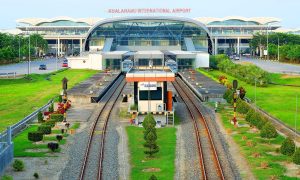A 38-year-old Indonesian woman plunged to her death through an elevator shaft and lay undiscovered for three days. How did this happen at an Indonesian international airport that has just accepted a $6 billion investment to make it a regional hub rivaling Singapore and Malaysia?
That is the question everyone is asking in Indonesia following the death of a woman named Aisiah Sinta Dewi who had visited Kualanamu International Airport in North Sumatra on April 24 this year to drop off a relative.
Grainy and harrowing CCTV footage, which subsequently went viral, told the rest of the story.
Once in the elevator, which had doors on both sides of the carriage, Dewi tried to exit the elevator with her back facing the door that opened. After the door opened and closed without Dewi seeing it, she called a relative to say that she was stuck in the elevator. Presumably becoming increasingly panicked, she pried open the second elevator door, which easily gave way, and exited, immediately falling through a wide gap between the floor and the elevator carriage.
Dewi then allegedly fell two storeys to her death at the bottom of the elevator shaft, which has a buffer zone known as a pit in order to stop people from being potentially crushed by an elevator car.
Worse was yet to come.
When Dewi’s family tried to locate her, they alleged that they were told that no one at the airport had been monitoring the CCTV camera in the elevator and that the family would not be allowed to check any of the footage for procedural reasons. They also alleged that the airport did not allow them to look for Dewi in the elevator shaft or to allow staff to check that she had not fallen into the elevator pit.
According to media reports, Dewi was only found three days after the incident when airport staff were alerted to the elevator shaft by the pungent smell of human decomposition emanating from it. Upon investigation, Dewi’s decomposing corpse was found in the very place her family suspected she had fallen, with airport staff telling the media that the subsequent evacuation process had been “difficult.”
Some five airport staff have also now been placed on administrative leave while the incident is investigated.
“This is an international-level airport. How can the safety standards be like this? And the response from the staff was very, very unsatisfactory,” Dewi’s brother, Raja Hasibuan, told local media of the incident.
Even the local ombudsman for North Sumatra, Abyadi Siregar, has been drawn into the melee. After inspecting the scene of her death, Siregar found that the airport had been negligent and unable to ensure the safety of those using its services—a potentially damning pronouncement that may hint at the airport’s prospects should this case come to trial.
It also comes at an inopportune moment.
Back in December 2021, Indonesia accepted a $6 billion proposal to transform Kualanamu International Airport into one of the busiest airports in the region with a projection of serving up to 50 million passengers annually and with a view to rivaling other regional hubs such as Singapore’s Changi Airport.
The airport, located close to the provincial capital of Medan in North Sumatra, is strategically close to Thailand, Singapore, and Malaysia, and, prior to the COVID-19 pandemic, serviced routes across Indonesia and the wider region.
As part of the deal, GMR Airports Consortium, which is made up of Indian-owned GMR Group and French Aeroports de Paris group, pledged an initial investment of $3.9 billion as part of a 25-year contract to develop the airport, with the remainder to come from the Indonesian authorities.
Speaking at the time, Srinivas Bommidala, GMR Group chairman for energy and international airports, said the company envisaged “transforming the airport into an international hub,” with a fivefold increase in travelers passing through its doors as opposed to pre-pandemic levels.
Yet now GMR Airports Consortium is facing legal action from Dewi’s husband, Ahmad Faisal, who told local media that he has filed a police report against Indonesian-owned Angkasa Pura Aviasi and Angkasa Pura Solusi which help to manage the airport, as well as GMR Airports Consortium.
“We have filed a report against six companies in total … We hope to take legal action that is in accordance with the Indonesian laws,” Faisal’s lawyer, Indra Posan Sihombing, said last Tuesday of the legal filings.
Whatever happens with the legalities of the case, it is clear that Kualanamu will have to answer serious questions from passengers about whether it can attain the international safety and duty of care standards expected of it.

































